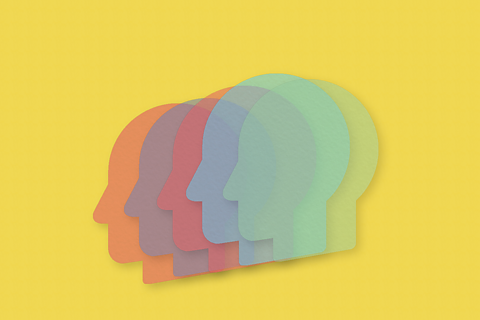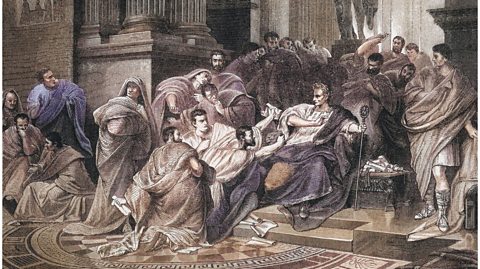Youãre visiting somewhere new and suddenly youãre overcome with a peculiar feeling of familiarity - as though youãd been there before. Weird, huh?
But this isnãt the plot of a sci-fi movie. This is dûˋjû vu and it may be one of the most mysterious of all our quirks of memory. To find out more, ǵüµÇ¨û§ Bitesize spoke to Dr Akira OãConnor, a senior lecturer in the School of Psychology & Neuroscience at the University of St Andrews.

What is dûˋjû vu?
Dûˋjû vu, a French term which translates to ãalready seenã, is a very common sensation, with studies showing that two-thirds of people have reportedly experienced it at least once in their lifetime.
ãDûˋjû vu is amazing,ã Dr OãConnor told ǵüµÇ¨û§ Bitesize. ãIn scientific terms itãs an inappropriate sense of familiarity for something that we know to be unfamiliar.
ãBut what really captures people is your memory telling you one thing, but you knowing and piecing together that what your memory is telling you is wrong.ã
But what actually causes it? For over a century scholars have had several ideas about what causes the experience. The term was possibly coined in the 1870s by the French philosopher ûmile Boirac in a book called The Psychology of the Future.
Since then it has been attributed to everything, from paranormal or supernatural causes to timing issues. The latter theory speculated it could be the result of one eye signal - or a neuron feed - reaching the brain slightly quicker than the other.
The causes of dûˋjû vu
But recreating what can be a fleeting experience in a laboratory environment poses its challenges. While there is no definitive answer to what causes dûˋjû vu, there are a number of possible scientific explanations.
Dr OãConnor explained: ãWhat we think happens during dûˋjû vu relies on you having an understanding of the organisation of the brain.
ãThereãs a part of the brain in the medial temporal lobe - the part of your brain that sits near your cheekbones and your ears - that is associated with laying down memories and giving you the feeling of remembering things.ã
ãThereãs another part of your brain at the front of the forehead, the frontal cortex, that is associated with what we call higher order cognition. So stuff like reasoning, decision making and fact-checking.ã
Dûˋjû vu may occur when, for some reason or another, something goes wrong in the medial temporal lobe that triggers a memory sensation known as familiarity. The brain then becomes overexcited and starts to signal that youãve experienced this place, event or situation before. You then get a conscious feeling of finding something familiar.
This sensation is then believed to pass through the frontal cortex, where the brain will process whether thereãs a chance you could have experienced the situation before. Once the fact-check processes determines that itãs not possible for this to have occurred, the frontal cortex will signal that the sensation was an error - completing the dûˋjû vu cycle.

Are there any benefits to dûˋjû vu?
Research shows that the frequency of dûˋjû vu may vary with age. Dr OãConnor told us: ãWe know people start reporting dûˋjû vu at around the age of five.ã From five, the it will increase until your early to mid-20s, where the experience peaks, before eventually decreasing during middle age.
But experiencing dûˋjû vu can even be a positive thing. The phenomenon is a sign that the fact-checking part of the brain is functioning well and helping you to accurately remember situations or events.
ãI think because people tend to think of dûˋjû vu as a bit of a memory error, people tend to get worried about it.
ãBut on the whole, I would say it's a sign of a good, healthy brain and mind.ã
Dûˋjû vu isnãt the only illusion of memory. Jamais vu, meaning ãnever seenã, is the opposite of dûˋjû vu and describes the experience of feeling unfamiliar with something that is very familiar to you. In 2023 Dr OãConnor and his collaborators were awarded the Ig Nobel Prize for Literature for their research on this topic.
ãPeople who are using ǵüµÇ¨û§ Bitesize will almost certainly have experienced that idea of having looked at a word so much that it starts to feel like itãs spelt wrong or you doubt that it really is a word.ã
Unlike dûˋjû vu, jamais vu is a memory quirk that can be induced easily. As part of this work, Dr OãConnor and his colleague studied the sensations participants felt when asked to repeatedly look or write out a series of words over and over. ãWe found that people were most likely to experience the sensation of unfamiliarity for the most frequently used words, so words like 'the'.
ãI guess that makes sense because if youãre going to feel any kind of unfamiliarity, itãs going to seem the most weird if itãs something thatãs super common and familiar to you.ã
This article was published in April 2024
Pizza around the world
To celebrate World Pizza Day, ǵüµÇ¨û§ Bitesize explores the ways countries have adapted one of our favourite meals

Three huge betrayals that made history
ǵüµÇ¨û§ Bitesize delves into the stories of three historical figures who betrayed their countries or political leaders.

Are these history's longest works of art?
From paintings that span miles, to million-word novels, ǵüµÇ¨û§ Bitesize takes a look at a selection of historyãs longest works of art.
